My ocean rowing boat, Sedna Solo, seems to be having quite an adventure of her own. After months of problems and delays, she was due to arrive into Miami from Antigua last Friday. But somehow she's ended up in Trinidad instead.
She was on board the CC Grenadines, bound for Miami, but the last I heard, the Grenadines had stopped off in Trinidad and all the freight containers unloaded. Sedna is now due to be reloaded onto a different ship, the CGM Barbados, which will go to Jamaica and then, finally, to Miami.
So Sedna is due to finally arrive on the US mainland this weekend. But I've heard that one before. I'll believe it when I see it....
(And then she still has to somehow get across the US from Miami to San Francisco - there are a number of options at the moment, but nobody seems very willing to tell me how much each option is going to cost me, which is making it difficult to make any kind of decision.)
|
|
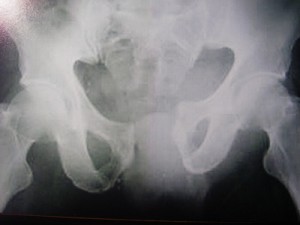
... makes us stronger, as Nietzsche said. A para-gliding accident didn't quite kill Fred Noble, but it was a close-run thing. Further to my blogs on how a split second can turn a person from able-bodied to disabled...
A couple of years ago, when Fred was 67, he had a serious fall while para-gliding in Brazil that forced his femur up into his pelvis, breaking it clean through the middle (which makes my little stress fracture look totally trivial).
Fred spent a full year in recovery, slowly and painfully restoring his body to health. For the early part of the year he was on intravenous morphine. The pain was so bad towards the end of each dosage period that he would be counting down the seconds until he could take his next morphine shot.
He had been an intrepid adventure heli-skiier, used to adrenaline rushes and wide open spaces. But now his perspective had changed. He recalls the day when he was able to put on his own sock - a major victory.
The road to recovery was long and hard, especially for someone no longer in the flush of youth. But eventually his perseverence through months of rehab paid off. He can now walk unaided, and is planning a heli-skiing trip to celebrate his 70th birthday next year.
There must have been many occasions when Fred wondered if he would ever walk again. But he took the big challenge and broke it down. One day trying to touch his toes. Then trying to put on a sock. Then rebuilding the strength in his legs. Little by little, he overcame probably the biggest challenge of his life.
Eric and I stayed with Fred in Portland last weekend, on our way back from Hawaii. We were talking about adventure and risk. Fred commented on how many people say, 'I could never do that', when what they really mean is 'I don't want to do that'. If they DID want to do something, they could find a way. They could come up with a plan, breaking the big challenge down into smaller chunks, or gradually acquiring the necessary skills and confidence, taking it one step at a time.
So often, our limits are the ones that we CHOOSE to impose on ourselves.
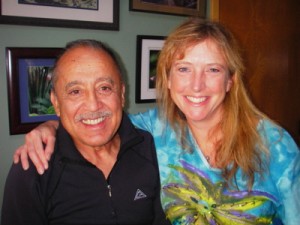
Fred and Roz
|
|
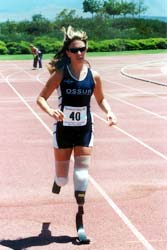
A friend of mine who is disabled (or are we supposed to say 'differently abled' in this age of political correctness? anyway, he walks with the aid of two sticks) has pointed out to me how lucky I am to be able to do the sports I do - or at least, if I can't do them, it's due to general klutzishness rather than lack of physical capacity.
I do, of course, realise this, and am grateful to have a (relatively) fit and healthy body, especially because I am keenly aware how in only a split second I could go from being able-bodied to being disabled. In the world of adrenaline junkiedom, there is any number of salutary tales of people who had a bad accident and lost forever their ability to take part in sports.
There are also the tales of people who suffered awful injuries, and managed to overcome them to continue competing and participating in sport. It would be nice to think that if something bad happened to me, I might have the resilience and strength of character to pick myself up and carry on constructively. I hope I never need to find out. So I'll continue to keep my sports strictly towards the low-adrenaline end of the spectrum.
[Photo: Jami Goldman, runner, who lost both her legs to frostbite when she was 19]
|
|
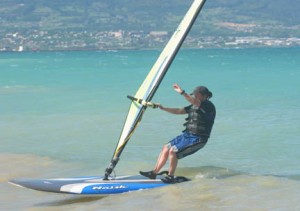
Why do some people assume that because I can row an ocean, I am generally sporty? Don't they know that most rowers row because they can't do anything else?!
I was apprehensive about my first ever windsurfing lesson this morning, and all the more so because my debut was to be photographed for an article in a windsurfing magazine. My sense of balance was quite finely honed after 3.5 months on a tippy little rowboat, but that was 8 months ago now and my legs are firmly re-accustomed to land. My hopes were modest - to spend just enough time on the board so we could get a decent photo.
Then there was the issue of my current camera-shyness. As if it hasn't been bad enough having to display my podgy white self on an island where most women are 100 pounds and brown as berries (much like I was when I arrived in Antigua, come to think of it) now my out-of-shapeness was due to be recorded for posterity. Mortifying.
Actually, it didn't turn out as badly as I'd expected. I'm far from being a natural, but at least I managed to avoid abject humiliation. I got the hang of steering and turning the board, and in an exhilarating run of, oh, at least 10 yards, almost looked like I knew what I was doing.
As for the photos, I'm pinning my hopes on Photoshop to hide a multitude of sins...
After I'd finished messing around on the water we went to watch the pros in action. Maui is hosting the Aloha Classic this week, and our host Matt Pritchard was competing. The weather has been too calm so far this week and even today the waves were apparently seriously substandard, but it was still jaw-dropping to watch the skill of people who REALLY knew what they were doing, especially now that I know just how hard windsurfing is to the uninitiated.
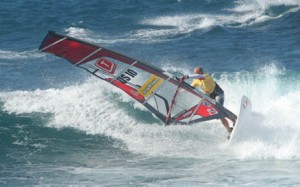
Matt Pritchard in action
|
|